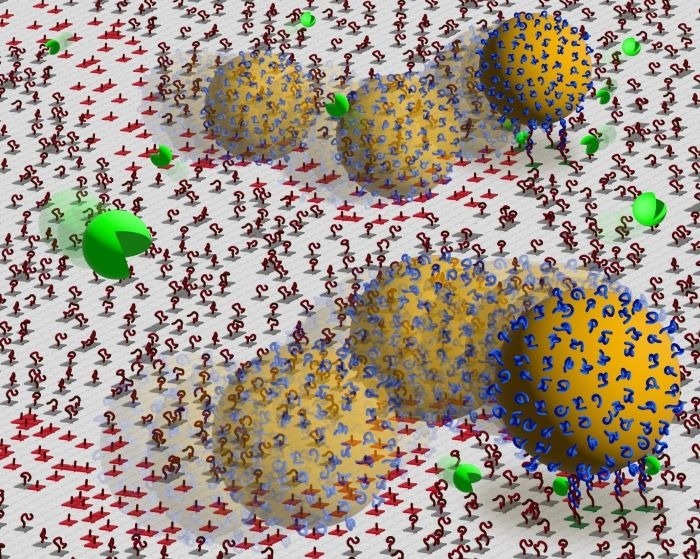Researchers from the Institute for Molecular Science aimed to level out the speed difference between artificial motors and motor proteins by improving the nanoscale artificial motor using their understanding of molecular motors. The study was published in Nature Communications.

Image Credit: Takanori Harashima
DNA-nanoparticle motors are minuscule artificial motors that use RNA and DNA structures to drive motion through enzymatic RNA degradation. The Brownian motion is biased to transform chemical energy into mechanical motion.
The DNA-nanoparticle motor employs the "burnt-bridge" Brownian ratchet mechanism. The degradation (or "burning") of the bonds (or "bridges") that the motor crosses along the substrate propels this kind of movement, effectively biasing the motor's motion forward.
These highly programmable nano-sized motors can be made for transport, diagnostics, and molecular computation applications. The problem is that DNA-nanoparticle motors are not as fast as their biological counterparts, the motor protein, despite their genius. Researchers use geometry-based kinetic simulation and single-particle tracking experiments to analyze, optimize, and rebuild a faster artificial motor.
Natural motor proteins play essential roles in biological processes, with a speed of 10-1000 nm/s. Until now, artificial molecular motors have struggled to approach these speeds, with most conventional designs achieving less than 1 nm/s.
Takanori Harashima, Researcher and Study First Author, Institute for Molecular Science
Switching the bottleneck is a suggested solution to the speed problem. The experiment and simulation demonstrated that the binding of RNase H serves as the bottleneck, slowing down the entire process.
RNase H breaks down RNA in RNA/DNA hybrids in the motor and is involved in genome maintenance. A slower total processing time results from longer pauses in motion caused by slower RNase H binding. The speed was significantly enhanced by increasing the RNase H concentration, reducing pause durations from 70 s to about 0.2 s.
However, run length (the distance the motor travels before detaching) and processivity (the number of steps before detachment) were sacrificed to increase the motor speed. According to the researchers, a higher DNA/RNA hybridization rate could enhance this trade-off between speed and processivity/run length, bringing the simulated performance closer to that of a motor protein.
The engineered motor achieved a speed of 30 nm/s, 200 processivity, and a 3 μm run-length with redesigned DNA/RNA sequences and a 3.8-fold increase in hybridization rate. The study shows that the DNA-nanoparticle motor can now function similarly to a motor protein.
Ultimately, we aim to develop artificial molecular motors that surpass natural motor proteins in performance.
Takanori Harashima, Researcher and Study First Author, Institute for Molecular Science
These artificial motors can be highly helpful in molecular computations based on the motor's motion and their potential for highly sensitive diagnosis of infections or disease-related molecules.
The simulation and experiment conducted in this study offer a promising future for DNA nanoparticles and related artificial motors, their capacity to mimic motor proteins, and their uses in nanotechnology.
Researchers Ryota Iino, Akihiro Otomo, and Takanori Harashima from the Graduate Institute for Advanced Studies at SOKENDAI and the Institute for Molecular Science at the National Institutes of Natural Sciences participated in this study.
This study was funded by the Tsugawa Foundation Research Grant for FY2023, JST ACT-X "Life and Information", Grant-in-Aid for Transformative Research Areas (A) (Publicly Offered Research) "Materials Science of Meso-Hierarchy" and "Molecular Cybernetics", Grant-in-Aid for Scientific Research on Innovative Areas "Molecular Engine", JST ACT-X "Life and Information", and JSPS KAKENHI.
Journal Reference:
Harashima, T., et al. (2025) Rational engineering of DNA-nanoparticle motor with high speed and processivity comparable to motor proteins. Nature Communications. doi.org/10.1038/s41467-025-56036-0